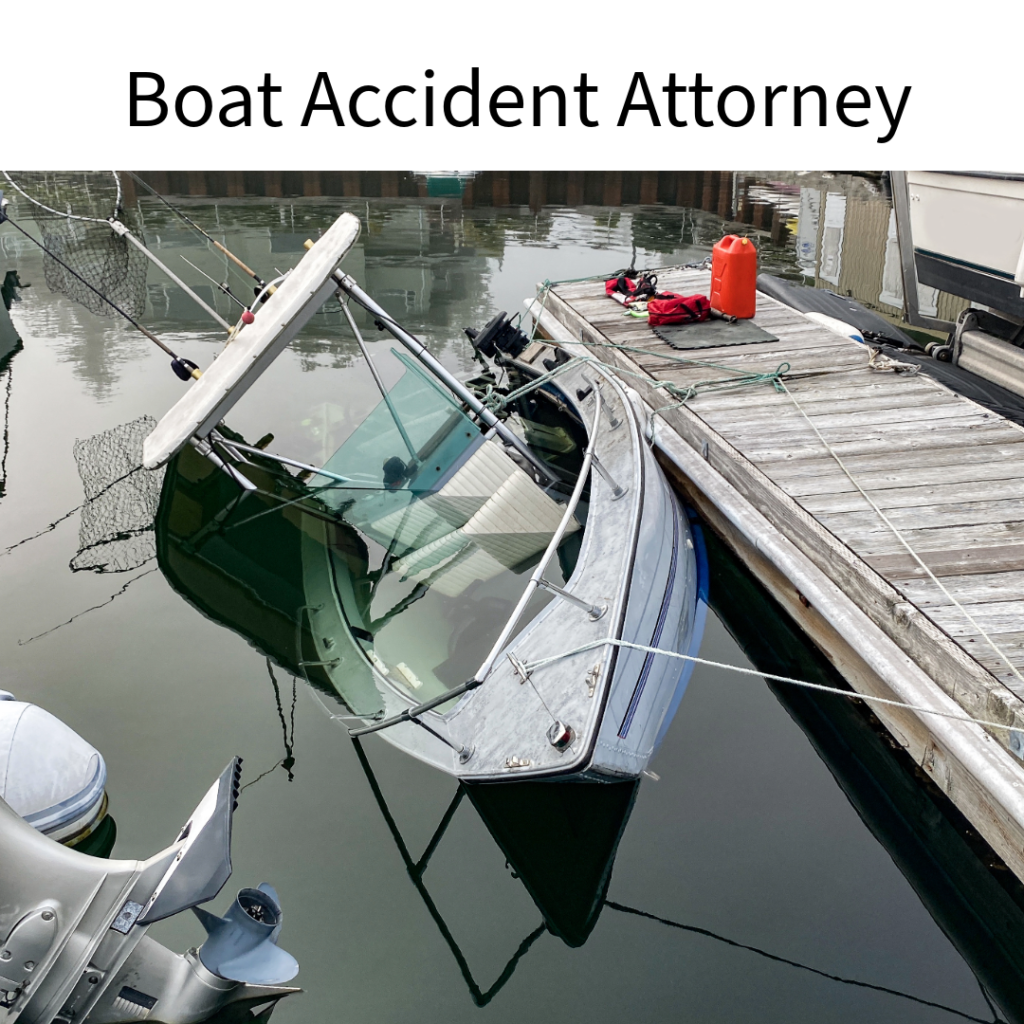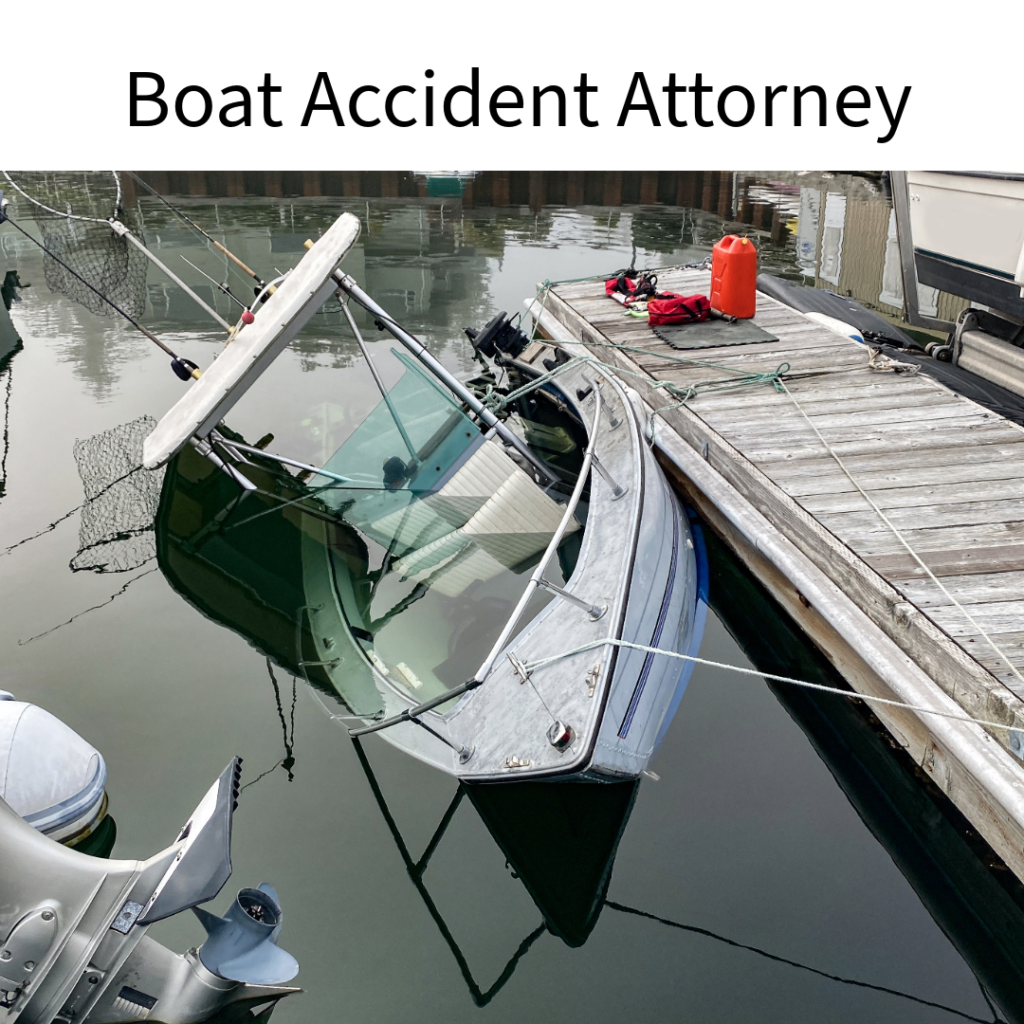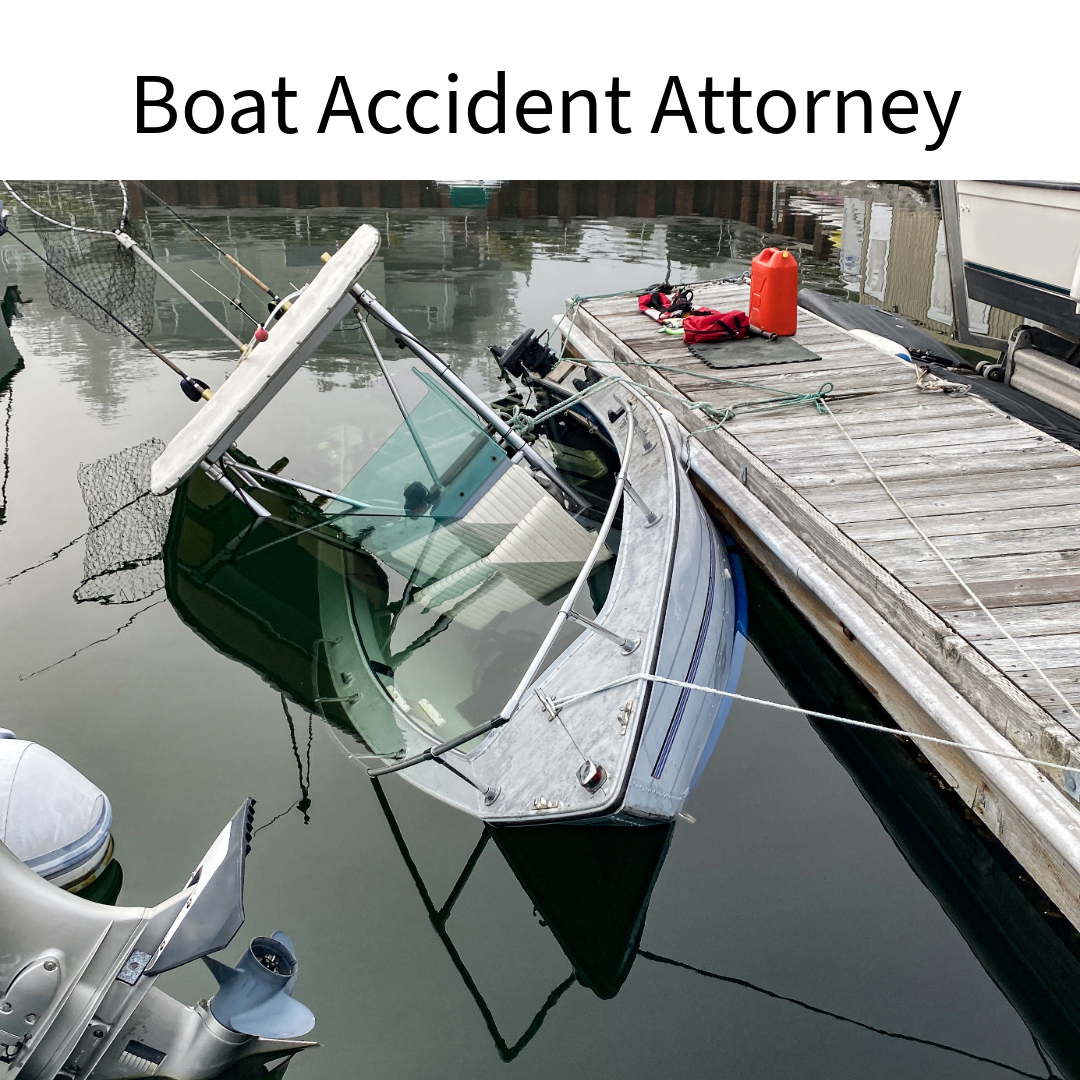Boat Accident Attorney: Boating, a favorite recreational pursuit for many, offers moments of joy and relaxation. However, the tranquil waters can sometimes turn tumultuous, leading to boat accidents with severe consequences. In this comprehensive guide, we delve into the intricate world of boat accidents, exploring the complexities victims face and the pivotal role a boat accident attorney plays in seeking justice and fair compensation.
Boat Accident Attorney:

Importance of Legal Representation in Boat Accident Cases:
One of the primary reasons to enlist the services of a boat accident attorney is their specialized legal expertise. Maritime law is a distinct field with its own set of rules and regulations. An attorney experienced in this domain possesses the intricate knowledge required to interpret and apply these laws effectively.
Boat accident cases often involve a web of complex laws and regulations. From understanding liability issues to deciphering the nuances of maritime law, a seasoned attorney guides clients through this intricate legal landscape. This expertise ensures that all aspects of the case are thoroughly examined and addressed.
Understanding Boat Accidents
Boating, often synonymous with leisure and adventure, can take an unexpected turn when accidents occur on the water. In this segment, we delve into the intricacies of boat accidents, exploring their definition, common causes, and the various ramifications victims may face in the aftermath.
Boat accidents encompass a broad spectrum of incidents that occur on water vessels. From collisions and capsizing to equipment failures, these accidents can lead to varying degrees of injuries, property damage, and, in unfortunate cases, fatalities. Understanding the diverse nature of boat accidents is crucial for both avid boaters and those seeking legal recourse after an incident.
Causes of Boat Accidents
A. Human Error
The majority of boat accidents can be traced back to human errors, ranging from negligence and inexperience to alcohol or substance impairment. Recognizing and addressing these factors is essential for preventing accidents and assigning liability in legal proceedings.
B. Environmental Factors
Boating is often at the mercy of nature. Adverse weather conditions, rough waters, and unexpected environmental changes can contribute to accidents. Navigating these external elements requires heightened awareness and preparedness to ensure safe boating practices.
C. Mechanical Failures
Boats, like any mechanical equipment, can experience failures. Whether due to poor maintenance, manufacturing defects, or unforeseen malfunctions, these issues can lead to accidents. Identifying the root cause is pivotal for both preventing future incidents and determining liability.
Importance of Legal Assistance
A. Legal Expertise
Understanding the legal implications of a boat accident is a complex task. A boat accident attorney brings specialized knowledge in maritime law, ensuring that victims receive appropriate legal guidance tailored to the intricacies of their case.
B. Navigating Complex Laws
Maritime laws differ significantly from general personal injury laws. A boat accident attorney helps navigate this intricate legal landscape, ensuring that all relevant regulations are adhered to during legal proceedings.
C. Maximizing Compensation
The aftermath of a boat accident often involves medical expenses, property damage, and emotional distress. A skilled attorney assesses the full extent of damages, formulating a strategy to maximize compensation for victims and alleviate the financial burdens they may face.
Legal Implications
Boat accidents, beyond the immediate physical and emotional toll, carry significant legal ramifications. In this section, we delve into the multifaceted legal implications that arise from boat accidents, encompassing aspects such as liability, compensation, and the intricate legal processes involved.
Legal Process in Boat Accident Cases
A. Investigation
Following a boat accident, a thorough investigation is essential to establish the sequence of events, identify responsible parties, and collect evidence. This initial phase lays the groundwork for the legal proceedings that may follow.
B. Filing a Lawsuit
When negotiations fail to produce a satisfactory resolution, filing a lawsuit becomes a necessary step. An attorney initiates legal proceedings, outlining the grounds for the case and presenting evidence to support their client’s claims.
C. Settlement Negotiations
Many boat accident cases are resolved through settlement negotiations. Attorneys engage with the at-fault party or their insurance company to reach a mutually agreeable resolution. Skilled negotiation is crucial to ensure victims receive fair compensation without the need for protracted litigation.
Why You Need a Boat Accident Attorney
Boating accidents, with their potential for serious consequences, necessitate more than just medical attention and repairs to damaged vessels. Engaging the services of a proficient boat accident attorney becomes paramount in navigating the complex aftermath. In this section, we explore the compelling reasons why individuals involved in boat accidents should seek legal representation.
Importance of Hiring a Boat Accident Attorney
A. Legal Expertise
Boat accidents fall under the jurisdiction of maritime law, a specialized field that demands a nuanced understanding. A boat accident attorney brings not only legal expertise but also a deep understanding of the specific laws governing accidents that occur on water. This knowledge is crucial for building a robust case and navigating the intricacies of maritime regulations.
Selecting the Right Boat Accident Attorney
When faced with the aftermath of a boat accident, choosing the right attorney can be a pivotal decision in navigating the complexities of legal proceedings and securing the compensation you deserve. In this section, we explore essential considerations for selecting the right boat accident attorney to ensure effective representation and a favorable outcome for your case.
How to Choose the Right Boat Accident Attorney
A. Experience in Maritime Law
Selecting an attorney with specific expertise in maritime law is paramount. Boat accident cases require a nuanced understanding of this specialized field. An attorney with experience in maritime law is better equipped to navigate the intricacies unique to accidents that occur on water. This expertise is instrumental in building a compelling case and effectively representing your interests.
Initial Steps After a Boat Accident
Boating accidents can be disorienting and stressful, but taking immediate and decisive actions in the aftermath is crucial for your safety and any potential legal proceedings. In this section, we outline the essential steps to take after a boat accident to ensure your well-being and to lay the groundwork for any future legal actions.
Steps to Take After a Boat Accident
The well-being of all individuals involved is the top priority. Ensure everyone is safe and, if necessary, move to a secure location on the boat or the shoreline. If there are injuries, promptly seek medical attention. Even seemingly minor injuries may have underlying complications, so it’s crucial to have a thorough medical evaluation.
The Legal Process
Navigating the legal aftermath of a boat accident involves a series of steps, each crucial in determining liability, securing compensation, and ensuring justice for those involved. In this section, we provide an overview of the legal process in boat accident cases, outlining the key stages from investigation to resolution.
Legal Process in Boat Accident Cases
After a boat accident, a comprehensive investigation is initiated. This includes examining the scene, collecting evidence, and determining the sequence of events leading to the accident.
The investigation aims to identify responsible parties, whether through human error, environmental factors, or mechanical failures. Determining liability is a pivotal aspect of the investigation.
Attorneys and investigators collect evidence, such as witness statements, photographs, and expert assessments, to build a compelling case. The strength of this evidence influences the subsequent legal proceedings.
If negotiations for a settlement prove unsuccessful, the next step is filing a lawsuit. Attorneys prepare the necessary legal documents outlining the grounds for the case, the damages sought, and the parties involved.
Once the lawsuit is filed, the defendant has a specified period to respond. Their response typically includes either admitting or denying the allegations and presenting their version of events.
Tips for Preventing Boat Accidents
1. Safety Equipment
Wear Life Jackets Ensure that all passengers, especially children, wear appropriate life jackets. Life jackets can be life-saving in the event of an accident or unexpected immersion.
Use Navigation Lights Employ proper navigation lights, especially during low visibility conditions or when boating at night. This enhances visibility and reduces the risk of collisions.
Carry Essential Safety Gear Have essential safety equipment on board, including a first aid kit, fire extinguisher, and emergency signaling devices. Regularly inspect and maintain these items.
2. Weather Awareness
Check Weather Conditions Before setting sail, check weather forecasts and be aware of potential changes in weather patterns. Avoid boating in severe weather conditions to prevent accidents caused by adverse weather.
Monitor Wind and Wave Conditions Be mindful of wind strength and wave height. Boating in conditions beyond your vessel’s capabilities can lead to instability and accidents.
Seek Shelter in Storms If unexpected storms arise, seek shelter immediately. Avoid navigating through rough waters during adverse weather conditions.
Legal Resources and Support Organizations
Local legal aid organizations provide assistance to individuals who may not have the financial means to hire a private attorney. These organizations offer legal guidance and, in some cases, representation for boat accident cases.

Conclusion
In conclusion, boating should be a source of joy and relaxation, but being prepared for unexpected events is essential. By understanding the legal nuances, seeking professional legal advice, and embracing preventive measures, boaters can contribute to a safer and more enjoyable boating community. In times of adversity, access to legal resources and support organizations ensures that individuals receive the assistance they need to navigate the complex aftermath of a boat accident and move toward recovery.
Frequently Asked Questions (FAQs)
A. What should I do immediately after a boat accident?
After a boat accident, prioritize seeking medical attention, documenting the scene, and reporting the incident promptly.
B. How long do I have to file a boat accident claim?
The timeframe to file a boat accident claim varies by jurisdiction; consult with an attorney to understand the specific deadlines.
C. Can I handle a boat accident claim without an attorney?
While possible, it’s recommended to hire an attorney due to the complexities of maritime law and insurance negotiations.
D. What factors contribute to determining compensation?
Compensation factors include medical expenses, lost wages, pain, and suffering, with a skilled attorney maximizing potential awards.
E. How can I find a reliable boat accident attorney?
Research attorneys with experience in maritime law, review their track record, and seek client testimonials for a reliable choice.
Also Read:
Keiser University Campus Map: Navigate Your Success 2024
Workers comp insurance: Unlocking Secrets 2024
